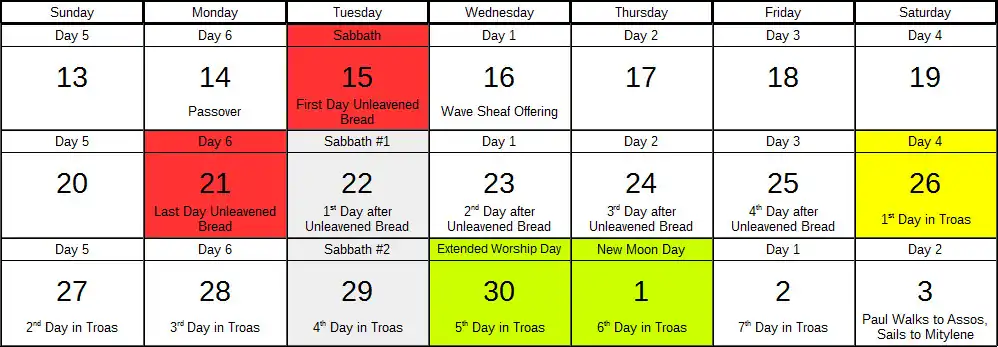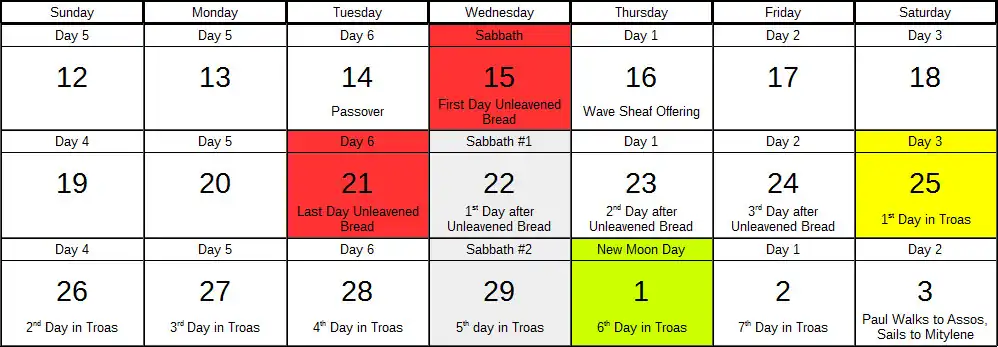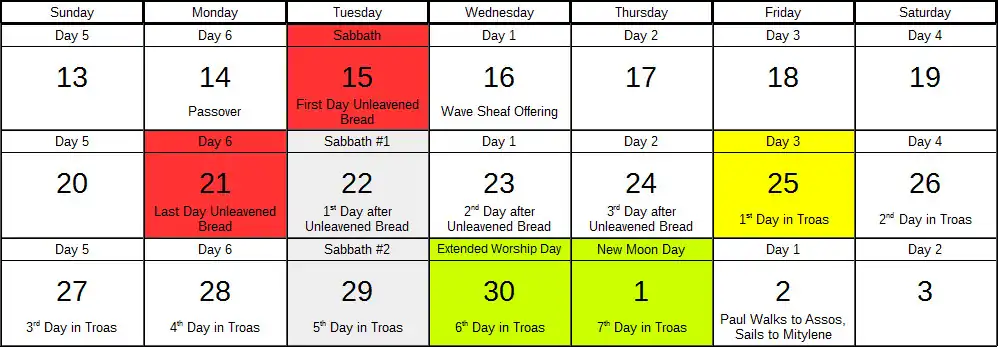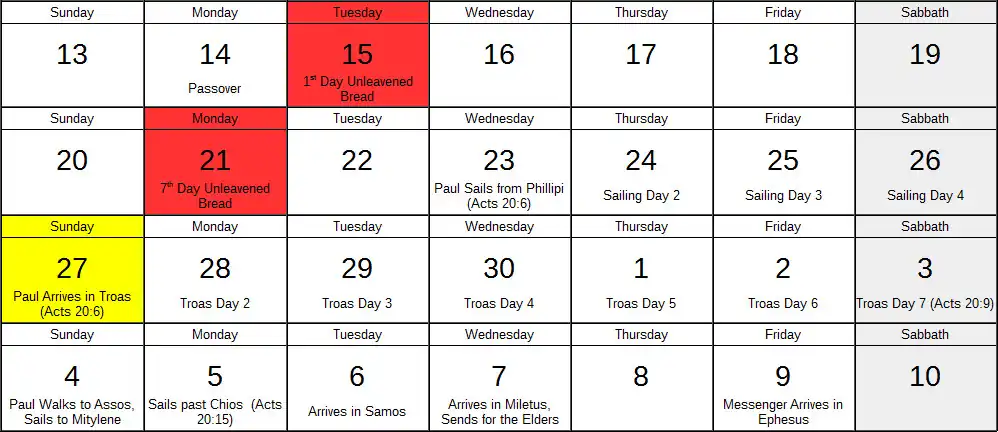Paul's Journey to Troas
Paul's Journey to Troas is often cited as a Pinpointed Lunar Sabbath. This page presents the rationale for considering it as a Pinpointed Lunar Sabbath, and discusses several objections.
Rationale
A segment of Paul's Third Missionary Journey proves that the Sabbaths of that month fell on the 8th, 15th, 22nd and 29th days of the month. Acts 20:6 documents that Paul left Philippi for Troas after the Days of Unleavened Bread were over, arrived five days later in Troas and stayed seven days. Acts 20:7 then says that Paul preached on the first day of the week, and that he departed the next day.
Since the last day of Unleavened Bread would be the 21st of the month, five days after that would be the 26th. Paul says in verse seven that the first day of the week was his last day in Troas (the seventh day). Counting forward seven days from the 26th puts that day on the second day of the month. That means that the seventh day of the week would be the eighth day of the month, and that the subsequent Sabbaths would be on the 15th, 22nd and 29th days of the month. See the calendar below for an illustration of this timing.

The "five days" mentioned in Acts 20:6 refers to five days after Unleavened Bread and not five days for the journey itself, since the distance from Philippi to Troas was only approximately 140 miles and this could be sailed in just two days.
Objections
Though the assertion presented above is valid, there are other possible scenarios that are just as likely and which do not require the Sabbaths of the month to fall on the 8th, 15th, 22nd and 29th days of the month. This depends on whether there are really five days between the Last Day of Unleavened Bread and Paul's arrival in Troas.
Length of the Lunar Month
The assumption made in the calendar shown above is that the first month of the year was thirty days long. However, because the cycle of the moon is approximately 29.5 days long, there is a 50% chance that the length of a month will be twenty-nine days instead. If the length of the first month was twenty-nine days instead of thirty days, then there would only be four days instead of five from the Days of Unleavened Bread until arrival in Troas in order for the dates to then line up with Lunar Sabbaths. See the example calendar below. In this scenario, the "five days" of Acts 20:6 cannot refer to five days after Unleavened Bread, as that would not allow enough days for the seventh day of the week to fall on a Lunar Sabbath.

First Day of the Week
The timeline of events can also be changed depending on how Acts 20:7 is interpreted:
And upon the first day of the week, when the disciples came together to break bread, Paul preached unto them, ready to depart on the morrow; and continued his speech until midnight.
The Assertion above assumes that the breaking of bread was during the daytime of the first day of the week. However, the passage also states that Paul spoke until midnight. That makes it more likely that the meal took place later in the evening. If the meal began after sunset, then this would mean that they broke bread the evening of the first day, and that Paul then departed "on the morrow" (in the morning) but still on the first day of the week. This interpretation also results in only four days between Unleavened Bread and Paul's arrival in Troas and therefore conflicts with the Assertion's timeline of events.

Five Days
It is also uncertain whether the "five days" referred to in Acts 20:6 is describing five days from the last day of Unleavened Bread, or five days of the actual journey. Several Bible Commentaries admit that the journey from Philippi to Troas could be accomplished in two days, which Paul apparently did in Acts 16:11[1]. However it is also possible that the journey by sailboat did actually take five days. This could have been due to adverse winds or storms that slowed their progress down to only twenty-eight miles per day instead of the typical seventy miles per day that they achieved later in the journey.
The original Greek of Acts 20:6 also seems to emphasise that the "five days" refers to the length of the journey and not the time from the last day of Unleavened Bread. The Greek word translated into English as "in" (from "in five days")is achri(ἄχρι), Strong's Number G891. This word implies a termination of time, often translated as "until" or "unto", not "after" or "over" five days from a specific time. The sentence structure in Greek is also a bit different than the King James translation:
ἡμεῖς δὲ ἐξεπλεύσαμεν μετὰ τὰς ἡμέρας τῶν ἀζύμων ἀπὸ Φιλίππων καὶ ἤλθομεν πρὸς αὐτοὺς εἰς τὴν Τρῳάδα ἄχρις ἡμερῶν πέντε, οὗ διετρίψαμεν ἡμέρας ἑπτά. (Acts 20:6, GNT)
Using the same words from the KJV but arranged as above, it reads as:
And we sailed away after the days of unleavened bread from Philippi, and came unto them to Troas in five days, where we abode seven days.
So it's very possible that the "five days" here describes the length of the journey and not the length of time from the Days of Unleavened Bread. Since the passage does not describe exactly what day they departed from Philippi (only sometime "after" the Days of Unleavened Bread), the five day journey could have started several days afterwards. For example, if Passover fell on a Monday, Paul could have taken one day on the 22nd to prepare for the journey before departing. See the example below:

See Also
Paul's Third Missionary Journey
References
- ↑ Robertson's Word Pictures of the New Testament, Acts 20:6